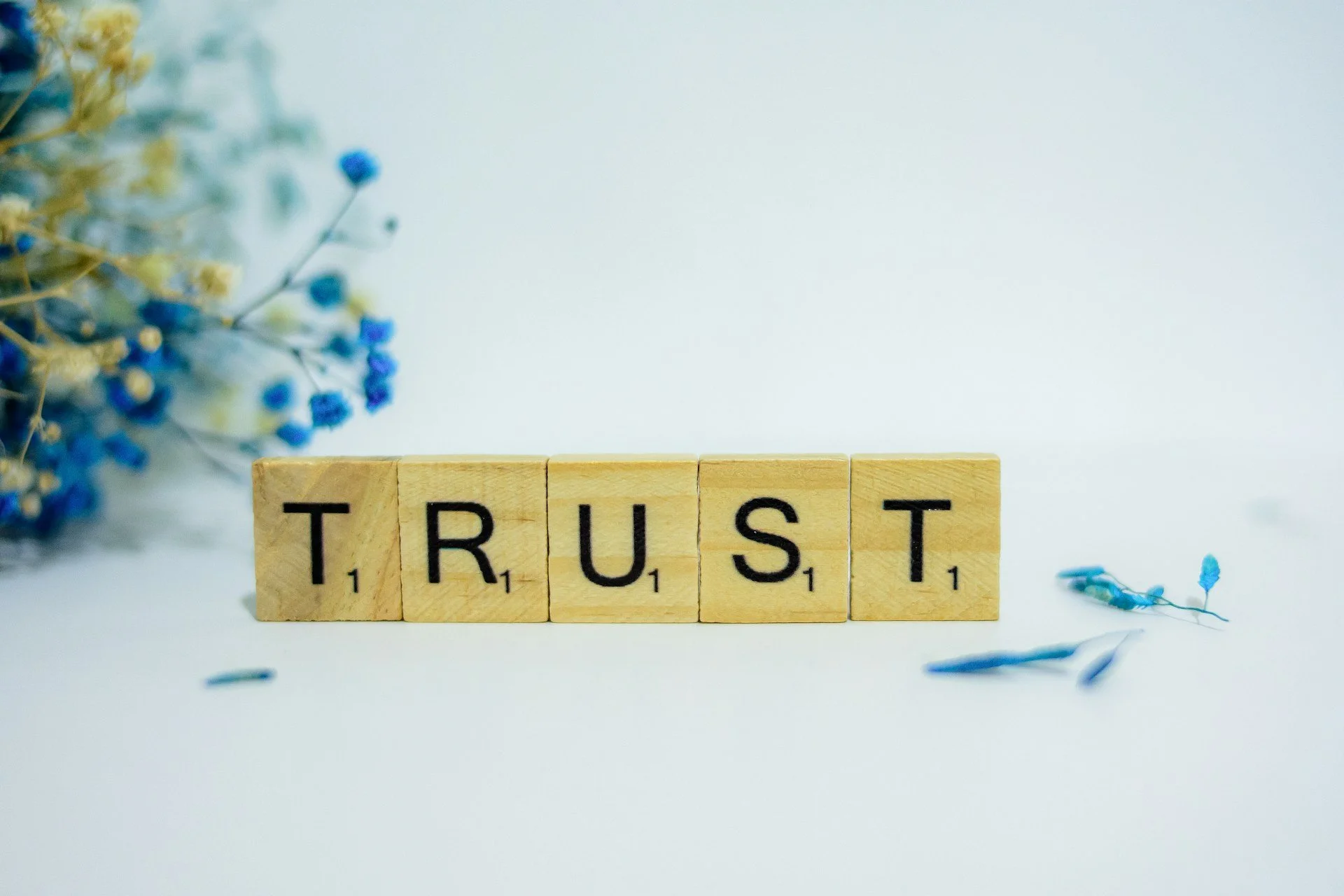The topic of trusting God comes up a lot in the Christian space. Whatever denomination you are and whatever secondary beliefs you hold, one thing remains true for all of us: we want to know how to start trusting God more.
And I don’t mean just theoretically. I mean in a real, practical way in our everyday lives. How do we actually put our faith into action? How do we truly, deep down in our soul trust the Lord?
Let’s discuss!
The Cliff Notes
Trusting God means we not only believe but also act.
Genuine trust in God means you quite literally put your life in His hands—physically, emotionally, financially, and on and on.
You can learn how to start trusting God more by staying connected to Him, remembering His past faithfulness, taking little steps of obedience, getting an accountability partner, and giving yourself grace.
What Is “Trust”?
Before we talk about how to trust God, let’s clarify what the word “trust” actually means. According to the Merriam-Webster dictionary, the verb trust means:
to rely on the truthfulness or accuracy of
to place confidence in (rely on)
to hope or expect confidently
Those three definitions are just what we would expect to find, right? I think we can all agree those are the things that come to mind when we think of trusting God. But here’s something interesting.
If you scroll down a little on the Merriam-Webster website, you’ll find another definition of trust as a verb:
to commit or place in one’s care of keeping (entrust)
to permit to stay or go or to do something without fear or misgiving
What the above says to me is that trust isn’t just about your heart posture (although that’s where it starts!), but it’s about actively giving things to God (committing them to His care). And—this is good, y’all—allowing Him to do what he wants with our life (permitting to stay or go) and doing something without fear.
In other words, trusting God means we not only believe but also act. That action might look like stepping out in faith to do something He has prompted you to do, or it could simply be releasing your tight grip of control and being open to what He has for you.
Genuine trust in God means you quite literally put your life in His hands—physically, emotionally, financially, and on and on.
How to Start Trusting God
Now that we’ve defined trust, let’s take a look at some practical ways you can learn to actually trust God in your everyday life.
1) Stay Connected to Him
OK, I know this seems super obvious, but the truth is, even as someone who’s been a Christian for over 30 years, staying connected to Jesus can be really difficult at times. Not because it’s hard to do, but because it’s easy to neglect.
I always relate this to a marriage relationship when I’m teaching my youth-age girls in Sunday School. When you’re married, you’re legally bound to that person no matter what (taking divorce out of the equation). So, even if you went a day or two without seeing or talking to your spouse, you’d still be married.
What would happen, though, is that your relationship would suffer. And if those two days turned into two weeks and then two months, you’d be so disconnected from your spouse that you might not even remember how to feel a connection with them anymore.
You’d grow farther and farther apart. But, again, you’ll still be married.
The same can be said about our relationship with God. Once you’re a born-again believer, the Bible says nothing can separate you from the love of God or remove you from His hand. (See Romans 8:38-39, John 10:28-29, and Ephesians 1:13-14.)
But here’s the thing. That’s referring to our salvation, our promised eternity with the Savior. So what about our personal relationship? Without spending time with God regularly, we lose that special connection. We stop hearing from Him. We stop being able to discern His leading.
We might even feel like He’s forgotten us—when, in reality, we’re the ones who have strayed. He never leaves or forsakes us.
So, what can you do to stay connected to God? It’s basic, but it’s the foundation of our faith: read your Bible and pray. Really, that’s it! (Or, at least, that’s the beginning and the most important part.)
If you don’t know where to start, I’d recommend getting connected with a local church if you aren’t already and asking if they have a ladies’ (or mens’ if you happen to be a man reading this) Bible study group that you could join.
Otherwise, you can check out the Bible app for your phone. It’s completely free, and there are tons of reading plans and devotionals to choose from. You can even pick which translation of the Bible you want to read in (my favs are NIV and NKJV).
2) Remember His Past Faithfulness
Nothing builds your faith more than recalling all the times in your life He’s been faithful before. Maybe you can think of specific prayers He’s answered, or a time when you were sick and He healed you. Maybe He provided a job at exactly the right moment.
I don’t know about you, but I can have pretty severe situational amnesia. Whenever I’m faced with a struggle or an uncomfortable situation, I tend to forget all the ways I’ve seen God work in my life before.
But remembering God’s faithfulness is so important! Even throughout the Old Testament, we see God instructing the Israelites to place stones or other things in certain spots as reminders—for them and for future generations.
Today, we don’t necessarily memorialize places in the same way the Old Testament Israelites did, but we can remember in different ways. For me, that’s journaling. It’s so cool to go back to years past and read the prayers I wrote down and see how God answered them.
(By the way, if you’re wanting to start journaling, check out my Read. Pray. Act.: Daily Prayer and Gratitude Journal with Prompts. It’s 100 days to grow closer to God, align your desires with His will for your life, and become more content in the waiting.)
In my experience, journaling is just a really great way to remember God’s faithfulness. But if you aren’t into journaling, you could also record voice notes in your phone.
Another option is to keep a prayer jar: jot down individual prayers and put them in a jar throughout the year, and then at the end of the year, take them out and read them to see how God has moved.
My advice: Find what works for you and fits easily into your lifestyle so you’re more likely to stick with it.
3) Take Little Steps of Obedience
Trusting God with something huge in your life is, well, huge! Trust is like a muscle; you’ve got to work it out regularly to build it up. But that doesn’t mean you have to start with some major, life-altering thing.
Instead, try taking one small step of obedience at a time. Those little steps will build your trust muscle until you’re ready to take the bigger leaps of faith.
What does that look like in a practical way? Let’s say a new neighbor just moved in across the street from you. You’ve felt the Holy Spirit nudging you to invite them to church, but you’re nervous. After all, you don’t know them! What if they think you’re crazy?
Instead of diving in head-first, start by going over and introducing yourself. Then, after a few conversations, maybe invite them to eat dinner with your family one night. Eventually, you’ll build up the courage to ask them to join you at church.
Or, maybe God’s calling you to write a book about your testimony. You don’t have to sit down and pound out an entire book right away. You could get your feet wet first by starting a blog or writing social media posts.
(Tip: Check out this free resource if you’re interested in blogging.)
Now, I feel like I need a caveat here. I’m not suggesting delayed obedience. When God tells you to do somethin’, ya best do it! (“If anyone, then, knows the good they ought to do but doesn’t do it, it is sin for them.” James 4:17)
But what I am saying is that it’s OK to start small. Take one step of obedience, then another, then another. Because when you do that, what happens is you’ll see how God rewards your obedience, and you’ll see that you can trust Him as you obey.
Before long, you’ll be ready to trust Him when He asks you to do something truly terrifying (like get up and speak in front of a room full of people!).
4) Get an Accountability Partner
“Accountability partner” is just church-speak for someone you can talk to about your walk with God (and they, in turn, can talk to you). But it’s not just anybody. It should be a close friend or family member, somebody you won’t be embarrassed to admit your shortcomings to.
This person should also be willing to shoot ya straight. No sugar-coating here! In order for an accountability partnership to be effective, you’ll both need to be able to tell each other the truth in love.
You want someone who isn’t afraid to call you out when you’re being stubborn or whiny. But they’ll also need to be willing to remind you of your blessings and maybe even discern how God’s currently working in your life in ways you might not see.
We weren’t meant to walk this earthly road alone, y’all. Surround yourself with your brothers and sisters in Christ, starting with an accountability partner.
5) Give Yourself Grace
Friend, nobody’s perfect. We’re all going to mess up in this faith journey over and over. Goodness, I’m sitting here writing this for you while at the very same time struggling with my own trust issues!
The good news is that God is so, so patient. He loves you more than you can possibly imagine, and he wants a close relationship with you. So, if you ask Him how to start trusting more, He’ll show you. His ultimate desire is your heart. He wants you to draw near to Him.
God’s not up in Heaven shaking His head when our trust wavers yet again. Rather, He’s waiting with open arms for you to turn to Him.
Beautifully Trustworthy
How to start trusting God more in your day-to-day life? It’s really about closeness to Him because He is beautifully trustworthy! All the tips above boil down to that one thing: drawing near to your Heavenly Father. When you do that, the rest will fall into place.
Bonus: Frequently Asked Questions
How can I stop worrying?
The Bible tells us over and over not to worry, but it’s not that easy, right? Worry creeps into our lives sometimes before we even realize what’s happening.
As you build your trust in God little by little with the above tips, you’ll find yourself worrying less and less. But in the meantime, take it to Jesus! 1 Peter 5:7 says, “Cast all your anxiety on him [God] because he cares for you.”
What does that look like? Prayer. Tell God what’s on your mind, release it to Him (meaning you surrender the outcome and allow Him to work however He sees fit), and then ask Him to fill you with peace.
Sounds simple, but it truly helps.
Why is it important to trust God? Does it even matter?
You could ask 100 people this question and get 100 different answers. But it all comes down to this: we live in a broken world. We’re going to face difficulties and pain and struggles for our whole lives…whether we trust God or not.
Wouldn’t you rather know the Creator of the entire universe holds your future in His hands? That, no matter what happens, He works things for your good and His glory? Isn’t it better to let Him fill your soul with peace instead of living in a constant state of stress and worry?
That’s why trusting God matters.



